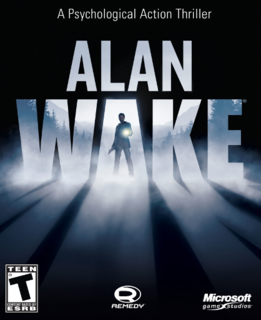When your story is this good, you can get away with a few things
Alan is a prima donna writer, escaping to Bright Falls to take some time off with his wife and try to work off a two-year case of writer's block. Everyone in town seems just a bit off, but maybe it's just that country air. Then again, maybe it's not. Alan blacks out soon after, waking up to his wife being kidnapped, and finding pages to a manuscript he can't remember writing. Worse yet, the script, a horror story called Departure, is unfolding all around him, with Alan himself as the main character.
There is a very obvious and constant motif of light and dark in everything. Enemies must be hit by your flashlight before becoming vulnerable, scattered streetlights are safe havens, the manuscript pages that shed light on parts of the story which have either happened already or will soon happen glow in attempt to call your attention, and for once flashbang grenades prove useful in a 3PS. What's great about this is that the gameplay reinforces the story, which in turn reinforces the gameplay. More games should try to do something like this.
So how is the gameplay? I think the best word in this situation is adequate. The worst part is that the game throws a bit too much on your plate some times. In order to kill one enemy, you must shine your flashlight on them, then shoot. You can use flashbangs for instant kills or flares to get yourself out of a crowd or to get those last few feet to the safe haven. The problem is that flares are far from plentiful until the end of the game, and shining your light on one specific target means you have no idea where his three friends are. Expect them to get more than a few cheap hits.Other than that it's not bad. Quick Time Events are present, but rare, and once you've got the hang of shooting ammo shouldn't be a concern. The worst part of the gameplay is that to shine your flashlight directly on a target you pull the left trigger. HOWEVER, doing this consumes batteries, and is the only way to aim properly. To aim without wasting batteries, you are meant to lightly pull LT, but the game blurs what light really means at times. Ideally, those controls should have been reversed. I'd rather hold the trigger down in a tense firefight than accidentally ease up on the light.
The story is every bit as good as they've said it was. It likes to play the plot close to the chest until about chapter 4, but after that everything pieces together perfectly, even with the add-ons included (which are psuedo-sequels to the main story before you get the twist spoiled for you). I don't want to say too much lest I spoil too much for you, but it will all make sense by the end. One thing I do want to point out, though, is that Alan likes to narrate parts of the game as they happen. For instance he wakes up during one sequence with a hangover, and a voice-over of Wake talks about a splitting headache and tells the player he needs to find his sunglasses and painkillers. This is a frequent occurrence in the game and may grow to annoy, but these are small complaints.
Audio-wise it's on par with everything else out there, but it fails in one very important way, and his name is Barry. Barry is Alan's agent, and a Joe Pechi impersonator, personality and all. Dear Remedy: Joe Pechi's humor is funny when Joe Pechi does it, not just some fat guy in a huge red jacket. He gets to be more bearable by the end of the game, but please, if there's going to be another game, get rid of him.
Since this is a thriller, there is little reason to go back to this game once you've found out how the story plays out. You already know the twist, your not writhing in suspense, you're just shooting some bad guys, no big deal. The add-ons are worth returning to the game, and you may want to find all the manuscript pages (which will require a journey through on the highest difficulty, something I didn't even try to do), but that's your call.
Overall
Design 9/10
Narrative 10/10
Gameplay 8/10
Audio 7/10
Replay 6/10
Final Score - 9.0

